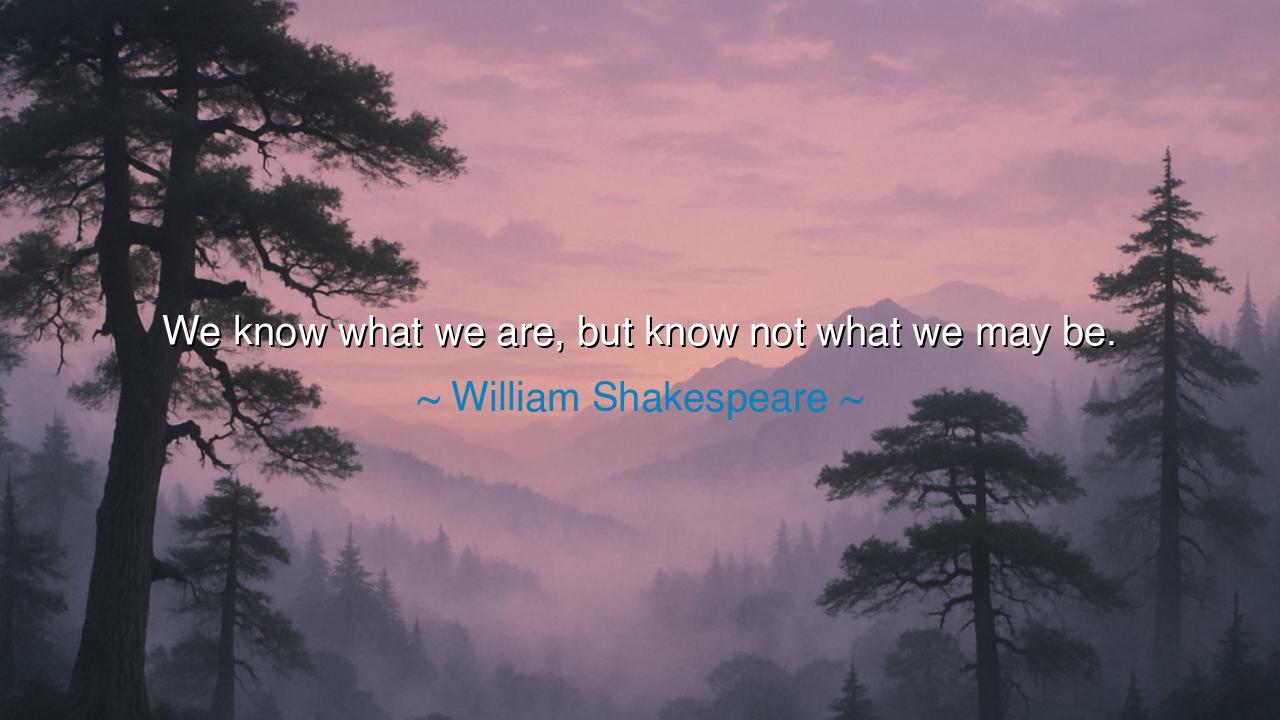
We know what we are, but know not what we may be.






“We know what we are, but know not what we may be.” — thus wrote William Shakespeare, the bard whose pen gave voice to the timeless riddle of the human spirit. In these words, spoken in his play Hamlet, he unveils a truth as vast as life itself: that we stand always on the edge of the known and the possible. We are aware of our present selves — our fears, our habits, our limitations — yet beyond this moment lies a horizon unseen, a field of infinite becoming. What we may be is the mystery that draws us forward, the silent call that stirs within every heart that dares to dream beyond its current form.
In the play, these words are spoken by Ophelia, a soul torn by grief and confusion, yet through her voice Shakespeare speaks of something universal. It is the human condition to live between what is and what might be, between the certainty of the present and the wonder of the future. Each of us, bound by time and circumstance, carries within a greater potential than we can yet perceive. We walk through life as seeds — small, defined, and limited — yet holding within the power to grow into something far beyond imagining. Thus, Shakespeare reminds us that identity is not a cage, but a beginning.
The ancients would have called this the mystery of transformation — the divine unfolding of the soul. For man, unlike the beasts, is not fixed in nature. The eagle may never become a wolf, nor the river a mountain; yet man may become saint or tyrant, poet or destroyer, healer or king. The present self is only a fragment of the whole. Within each life lies an unwritten story, shaped not by fate alone but by choice, courage, and imagination. “We know what we are,” says Shakespeare, for we can name our faults and see our reflection — but “we know not what we may be,” for the future self has not yet awakened. It sleeps, waiting to be born from our decisions, our faith, and our striving.
Consider the life of Nelson Mandela, a man who began as a prisoner but became a symbol of freedom. For twenty-seven years, he sat confined, surrounded by stone walls that sought to define his existence. Yet though the world knew what he was, even he could not have foreseen what he would become. From the chains of captivity emerged a spirit unbroken — a man of forgiveness, leadership, and unyielding grace. His story reveals Shakespeare’s truth: that no present condition can imprison the boundless potential of the human soul. What we are today does not dictate what we must be tomorrow.
And yet, this transformation is not automatic; it requires awareness and will. Many live their lives as though their current form were final — content with what they know, fearful of what they might become. But those who dare to seek, to change, to step into uncertainty, become as explorers of the inner world. For growth often demands the death of comfort. The butterfly must first cease to be a caterpillar; the student must unlearn before he can understand. Shakespeare’s words, though gentle in tone, carry a thunderous call: Do not mistake the present self for the eternal self. You are not finished — you are only in the making.
The journey toward what we may be is the great adventure of life. It calls for patience when the path is unclear, faith when the light seems dim, and humility to accept that the soul is always unfolding. Even in failure, we are being shaped. Even in sorrow, we are being refined. The self of today, though flawed, is the clay from which tomorrow’s greatness will rise. Therefore, the wise man does not despair at his imperfection — he treasures it as evidence that he is still becoming.
So, dear listener, take these words of the Bard as both comfort and challenge: “We know what we are, but know not what we may be.” Do not cling too tightly to your present form, nor fear the unknown that lies ahead. Strive daily to listen to the quiet voice within — the one that whispers of greater purpose, higher love, deeper strength. Feed it with learning, nurture it with courage, and guide it with kindness. For what you may be is not yet written — but if you live with faith and fire, the world will one day look upon you and see what even you could not imagine.
And so, let it be remembered: the miracle of man is not in what he has become, but in what he still may become — infinite in possibility, divine in spirit, forever reaching toward the light.






AAdministratorAdministrator
Welcome, honored guests. Please leave a comment, we will respond soon